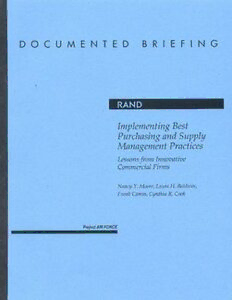Download Implementing Best Purchasing and Supply Management Practices: Lessons from Innovative Commercial Firms PDF Free - Full Version
Download Implementing Best Purchasing and Supply Management Practices: Lessons from Innovative Commercial Firms by Nancy Moore in PDF format completely FREE. No registration required, no payment needed. Get instant access to this valuable resource on PDFdrive.to!
About Implementing Best Purchasing and Supply Management Practices: Lessons from Innovative Commercial Firms
How "best in class" commercial firms implement innovative practices in purchasing and supply management, with implications for goods and services acquisition in the federal government. Because the U.S. Air Force spends over one-third of its budget on nonweapons purchased goods and services, such purchases are a prime target area in which to seek performance improvements and cost savings. Prompted by a need for improved performance from its supply base, the Air Force has become increasingly aware of the advantages of using market research, contract consolidation, supply base rationalization, and other leading purchasing and supply management (PSM) practices in its dealings with suppliers. To aid the Air Force in its PSM efforts, RAND examined how innovative commercial firms implement such practices in their purchases of good and services. After a review of the academic and trade literature, the study team conducted a series of elite interviews using a structured questionnaire to gather primary data from "best in class" commercial firms. The key findings are that (1) innovative commercial firms are moving to a strategic, goal-oriented approach to PSM, (2) implementing new PSM practices can take a number of years and often requires significant, permanent change throughout the organization, and (3) the Air Force needs strategies to sustain continuity of support for serious PSM change from one leadership team to the next. 450-character abstract: RAND examined how innovative commercial firms implement purchasing and supply management (PSM) practices in their purchases of good and services. Key findings: (1) innovative commercial firms are moving to a strategic, goal-oriented approach to PSM, (2) implementing new PSM practices can take a number of years and often requires significant, permanent change throughout the organization, and (3) the Air Force needs strategies to sustain continuity of support for serious PSM change from one leadership team to the next.
Detailed Information
| Author: | Nancy Moore |
|---|---|
| Publication Year: | 2002 |
| ISBN: | 9780833030078 |
| Pages: | 132 |
| Language: | English |
| File Size: | 0.709 |
| Format: | |
| Price: | FREE |
Safe & Secure Download - No registration required
Why Choose PDFdrive for Your Free Implementing Best Purchasing and Supply Management Practices: Lessons from Innovative Commercial Firms Download?
- 100% Free: No hidden fees or subscriptions required for one book every day.
- No Registration: Immediate access is available without creating accounts for one book every day.
- Safe and Secure: Clean downloads without malware or viruses
- Multiple Formats: PDF, MOBI, Mpub,... optimized for all devices
- Educational Resource: Supporting knowledge sharing and learning
Frequently Asked Questions
Is it really free to download Implementing Best Purchasing and Supply Management Practices: Lessons from Innovative Commercial Firms PDF?
Yes, on https://PDFdrive.to you can download Implementing Best Purchasing and Supply Management Practices: Lessons from Innovative Commercial Firms by Nancy Moore completely free. We don't require any payment, subscription, or registration to access this PDF file. For 3 books every day.
How can I read Implementing Best Purchasing and Supply Management Practices: Lessons from Innovative Commercial Firms on my mobile device?
After downloading Implementing Best Purchasing and Supply Management Practices: Lessons from Innovative Commercial Firms PDF, you can open it with any PDF reader app on your phone or tablet. We recommend using Adobe Acrobat Reader, Apple Books, or Google Play Books for the best reading experience.
Is this the full version of Implementing Best Purchasing and Supply Management Practices: Lessons from Innovative Commercial Firms?
Yes, this is the complete PDF version of Implementing Best Purchasing and Supply Management Practices: Lessons from Innovative Commercial Firms by Nancy Moore. You will be able to read the entire content as in the printed version without missing any pages.
Is it legal to download Implementing Best Purchasing and Supply Management Practices: Lessons from Innovative Commercial Firms PDF for free?
https://PDFdrive.to provides links to free educational resources available online. We do not store any files on our servers. Please be aware of copyright laws in your country before downloading.
The materials shared are intended for research, educational, and personal use in accordance with fair use principles.

